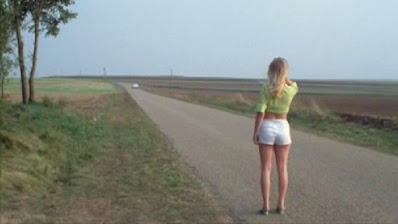Robert Fuest
I originally wrote this film off with a mediocre rating but decided to give it a second shot and I'm glad I did. I now have a new appreciation for it. Two young nurses; reserved and virginal Jane (Pamela Franklin) and the more adventurous and immature Cathy (Michele Dotrice) are spending their holiday away from the hospital taking a bike trip around Europe. While somewhere in France, they stop at a cafe and spot a handsome, sunglasses-sporting stranger (Sandor Elès), who they'll see several more times on their journey. Cathy harmlessly flirts with him and then the girls are on their way through the countryside. Jane's enjoying the peace and tranquility, while Cathy is bored out of her mind. You see, she's looking for a little excitement and seems much more interested in meeting guys than sight-seeing. She'll soon get her wish, just not in the way she'd hoped. The two girls stop by a wooded area to take a brief rest. With the nearest village possibly miles away, Jane suggests they hit the road so they can find lodging before nightfall. Cathy doesn't want to and accuses her friend of being boring and bossy. After an argument, Jane rides off and leaves Cathy behind to hang out her wet underwear on the trees, listen to the radio and catch some sun. It will be the last time Jane sees her friend.
While stopped by a local inn, a French woman tries to warn Jane about something but all she can squeeze out in English is "bad road," which gets Jane to thinking she better head back to the wooded area to find her friend. When she arrives, she finds a camera but no sign of Cathy. The Frenchman Cathy had been flirting with earlier however does show up and introduces himself as Paul. He offers to take Jane back to the village on his motor scooter so she can keep searching. Once there, they learn that no one has seen Cathy pass through. Paul takes off to search for her and Jane finally finds someone who speaks English, a schoolmistress (Clare Kelly), who informs her that three years ago a tourist had been raped and murdered there: the victim of a sex maniac who was never caught. Trapped in a country where few people know English, many of the locals are uncooperative and the one man who offers up help seems shady to put it mildly, Jane's got her work cut out for her.
Many aspects of this low-key British production (filmed on location in France) are quite commendable. The desolation of the area is palpable and the director creatively exploits the miles and miles of straight country road, lush green fields and stirring branches in the forest to sometimes eerie effect. Fuest is also able to slowly amp up the terror and suspense without once resorting to shock effects. The scene of Cathy alone in the woods slowly realizing that someone is there with here is an outstanding set piece and a texbook example of how to stage an effective and scary scene. Ditto for a scene at the very end where one of the suspected killers searches through a junkyard full of trailers looking for Jane, who's hiding in one of them. The mystery aspects of the storyline sufficiently keep you guessing, though they're rather lazily achieved by making every single person in this movie behave suspiciously, even when it makes no sense. There is one character in particular whose sketchy behavior is rather senseless (and frustrating in retrospect). If he'd been forthright the entire time - and he has no real reason not to be - poor Jane would have definitely been spared a whole lot of trouble.
Overall, it's an imperfect but still pretty impressive debut for director Fuest, who'd go on to make his biggest splash the following year with the very successful THE ABOMINABLE DR. PHIBES (1971), which would go on to become a cult classic and was followed by a middling 1972 follow-up. Fuest also made the badly-received sci-fi film LAST DAYS OF MAN ON EARTH (1973), the badly-received all-star-cast Satanism movie THE DEVIL'S RAIN (1975) and the forgettable REVENGE OF THE STEPFORD WIVES (1980). Mr. Fuest passed away earlier this year.
The Anchor Bay DVD has commentary by Fuest and co-producer / co-scripter Brian Clemens. It was remade (from all indications, rather poorly) in 2010.
★★★

































